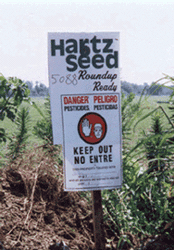| To the previous article | To the next article |

| To the previous article | To the next article |

Genetically modified organisms represent a growing array of genetic, ecological, and biological instability. The ecological consequences of current genetic modification (GM) efforts may be unpredictable and far-reaching, including changes in agricultural systems, pest pressure, crop physiology and soil health. Thousands of GM products have been field tested and over a dozen have been approved for commercial use in the U.S. Over the past five years, breeder focus has been significantly devoted to the development and marketing of either herbicide-tolerant or Bt-transgenic varieties of top-selling hybrids. In 1998, 19.8 million hectares of herbicide-resistant crops and 7.7 million hectares of maize crops consisting of insect-resistant plants were planted worldwide (excluding China). In the year 2000, about 60 million hectares are projected to be grown with GM crops (Zechendorf, 1999).
 |